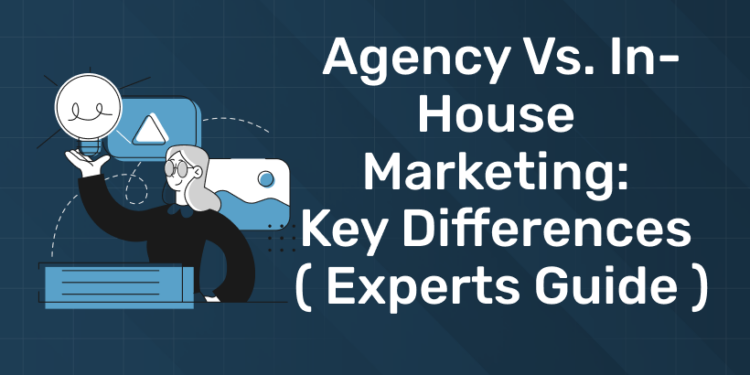Table of Contents
Both agency and In-House marketing are two types of marketing techniques. In this article, we will discuss Agency vs. In-House Marketing: Key Differences.
Both these marketing techniques have their pros and cons. The company should look into all the pros and cons before deciding on the marketing technique. Let us have a look at both the marketing techniques in detail.
Learn Digital Marketing Fundamentals! Get Free Demo Here!
Agency vs. In-House Marketing: Key Differences ( Experts Guide )
Marketing is the process of promoting products or services to attract and keep customers. It involves understanding what customers want, creating products that meet those needs, and making them known through advertising and other methods. The goal is to sell products, build brand loyalty, and make customers happy.
In-House Marketing:
What is it?
- Doing all marketing activities within the company.
- No hiring external agencies or consultants.
What’s Involved?
- Planning: Setting goals, researching the market, and deciding how to reach customers.
- Creativity: Making ads, writing content, and designing materials.
- Execution: Running campaigns, managing ads, and talking to customers.
- Analysis: Watching what works, learning from it, and planning the next steps.
Why Do It?
- Control: Keep a close eye on everything.
- Understanding: Know the brand and customers really well.
- Cost-Effective: Save money in the long run.
- Flexibility: Adapt quickly to changes.
- Building Expertise: Train and grow your own marketing team.
Pros:
Control and Alignment:
- You have full control over your marketing strategy, ensuring it matches your brand perfectly.
Deep Understanding:
- Your team knows your brand and audience inside out, leading to more effective campaigns.
Cost Efficiency:
- Over time, it’s often cheaper than hiring external agencies because there are no extra fees.
Flexibility:
- You can quickly change strategies as needed, staying agile in a fast-moving market.
Building Expertise:
- By investing in your team, you cultivate internal talent for long-term growth.
Cons:
Resource Requirements:
- It takes time and money to build and maintain an in-house team.
Limited Skill Set:
- Your team might lack specialized skills that agencies offer, like SEO or graphic design.
Risk of Tunnel Vision:
- Your team might get too focused on internal views, missing important market trends.
Difficulty Scaling:
- Expanding your team can be tough during periods of rapid growth.
Staying Updated:
- It’s challenging to keep up with the latest marketing trends and tools internally.
Digital Marketing Agency
What is it?
- A company that helps businesses with online marketing.
- Offers various digital marketing services.
What’s Involved?
- Strategy: Planning how to market online effectively.
- Services: Providing SEO, PPC, social media, content creation, etc.
- Execution: Running online ads, managing social media accounts, optimizing websites, etc.
- Analytics: Tracking results, analyzing data, and making improvements.
Why Use One?
- Expertise : Access to specialists in various digital marketing areas.
- Time-Saving : Letting professionals handle online marketing while focusing on other aspects of the business.
- Scalability : Easily adjust marketing efforts as the business grows.
- Stay Updated : Benefit from the agency’s knowledge of the latest digital marketing trends and tools.
Pros:
- Expertise : Access to digital marketing specialists for high-quality work.
- Time-Saving : Professionals handle online marketing, freeing up your time.
- Scalability : Easily adjust marketing efforts as your business grows.
- Stay Updated : Agencies keep up with the latest digital trends, keeping your strategies current.
- Fresh Perspective : Agencies bring new ideas and avoid internal biases.
Cons:
- Cost : Hiring an agency can be expensive compared to doing it in-house.
- Dependency : Giving up some control over your marketing strategy and execution.
- Communication Challenges :Distance and different styles may lead to communication issues.
- Less Customization : Agencies may not tailor strategies perfectly to your business.
- Limited Understanding : They may not know your business as deeply as an in-house team.
Learn Digital Marketing Fundamentals! Get Free Demo Here!
Key difference between in house marketing and agency
| Aspect | In-House Marketing | Agency Marketing |
| Control and Ownership | Full control over marketing decisions | Relinquish some control for expertise |
| Resource Management | Investment in hiring and training | Paying fees for agency services |
| Expertise and Specialization | Deep knowledge specific to company | Diverse expertise across marketing areas |
| Flexibility and Adaptability | Quick adaptation to changes | Scalability without internal restructuring |
| Cost Structure | Initial investment with long-term efficiency | Paying fees or retainers for services |
Similarities between In-house Marketing and digital marketing Agency
Goal-Oriented Approach:
- Both aim to achieve marketing objectives set by the company.
Utilization of Digital Channels:
- Both use online platforms like social media and search engines for marketing.
Focus on Audience Understanding:
- Both prioritize understanding the target audience’s needs and behaviors.
Emphasis on Data and Analytics:
- Both rely on data to measure campaign effectiveness and make improvements.
Continuous Improvement:
- Both strive to optimize strategies based on performance insights.
Creative Content Development:
- Both focus on creating engaging content to convey brand messages.
Integration with Business Strategy:
- Both align marketing efforts with the company’s overall goals.
Conclusion:
In this article we have discussed about in-house and agency marketing. The company can choose any of the two based on their needs and budget. Both have their own pros and cons.
Frequently Asked Questions
What to consider when choosing a digital marketing agency?
Choosing a Digital Marketing Agency:
- Expertise and Services: Ensure they offer the services you need.
- Reputation and Experience: Look for proven success in your industry.
- Transparency and Communication: Prioritize clear and open communication.
- Customization and Flexibility: Seek tailored solutions for your business.
- Value and Pricing: Assess the cost versus the expected return on investment.
- Collaborative Approach: Choose an agency willing to work closely with your team.
- Technology and Tools: Verify they have access to advanced analytics and reporting.
- Scalability: Ensure they can accommodate your business’s growth.
- Ethics and Values: Align with an agency that shares your values and ethics.
Who are the target audience for digital marketing agency?
The target audience for a digital marketing agency includes businesses of all sizes, entrepreneurs, marketing professionals, e-commerce businesses, local businesses, global corporations, and nonprofit organizations seeking to enhance their online presence, attract customers, and drive growth through digital channels.
What are in-house marketing activities?











